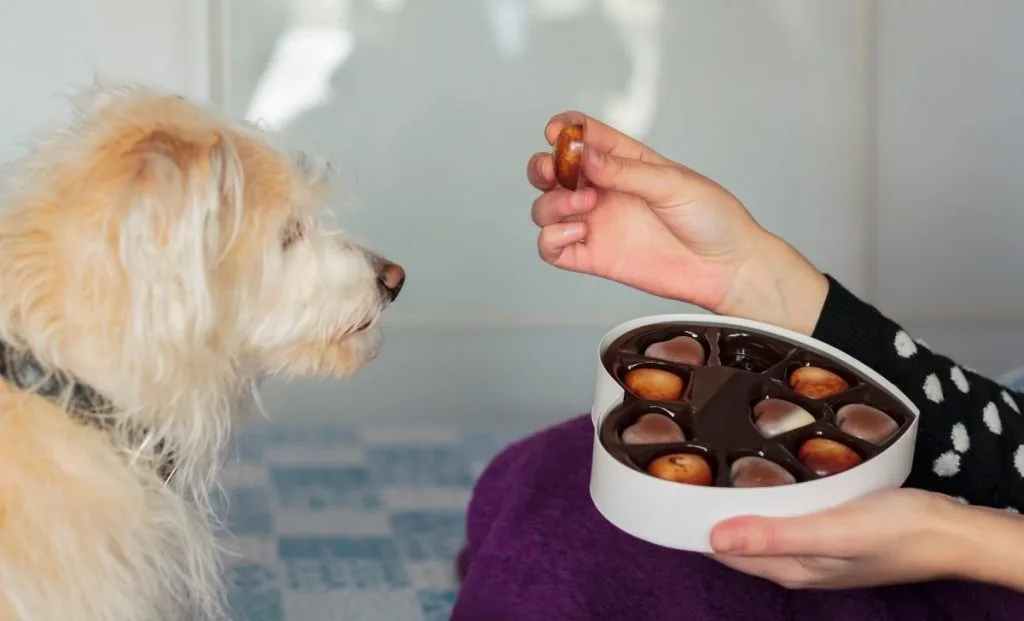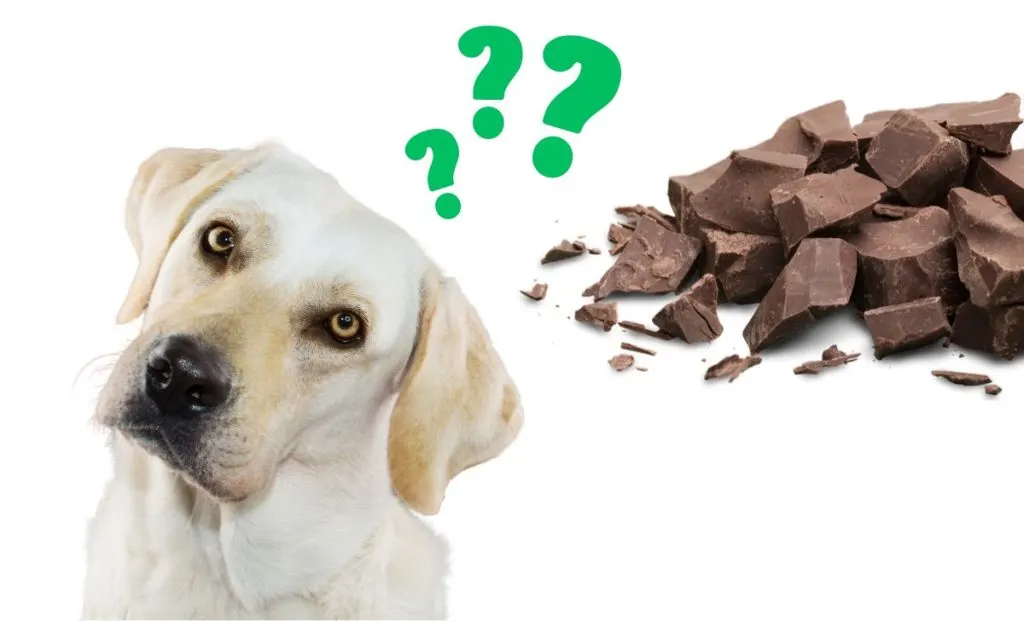Our dogs are master beggars, especially if they see us eating something they might think is delicious. We love sweets so much, and our furry companions deserve all the greatest pleasures in the world. So, why can’t dogs eat chocolate, and why shouldn’t we give them a few bites?
We know lots of chocolate and other sugary meals aren’t healthy for us. Most of us eat it regardless. Sure, if we overeat it, there might be some consequences, but most people won’t have any issues in eating unhealthy things in moderate amounts. So, why isn’t the same for dogs?
You’ve probably heard by now that chocolate is bad for dogs, cats, and other pets. But how dangerous is it? And is it so harmful we shouldn’t let our pups even try it?
Let’s find out the sad truth.
Why Is Chocolate Dangerous For Dogs?

Many people are wondering why can’t dogs eat chocolate. The answer might not be what you’ve expected.
The truth is that chocolate is toxic for dogs. It’s rarely fatal, but it can cause serious health issues for your pup.
Chocolate contains several toxic compounds to our four-legged companions. This includes caffeine but also theobromine.
Theobromine is a chemical similar to caffeine and is used as a diuretic, heart stimulant, blood vessel dilator, and smooth muscle relaxant.
Dogs cannot digest caffeine and theobromine the same way as we do. As such, these two compounds are extremely toxic to them, although they are fairly harmful to us.
Black chocolate is considered a healthier alternative to milk chocolate, but it is more harmful to dogs as it contains higher levels of these toxic additives.
What About White Chocolate?
White chocolate also contains theobromine but in much lower doses than milk or black one. In fact, white chocolate contains about 20 times less theobromine than milk chocolate! It also doesn’t contain as much caffeine, making it a much milder option.
Still, this doesn’t mean white chocolate isn’t toxic to dogs. It is simply unlikely to cause a severe reaction.
While any amount of theobromine can be harmful, white chocolate also contains high amounts of sugar and fat. This can cause numerous health problems, such as pancreatitis.
It is better not to give your dog any type of chocolate, no matter how delicious a treat it is to us.
How Much Chocolate Is Toxic To A Dog?

I would advise you all to stay clear of giving your dog any amount of chocolate. In other words, I would say that any amount of chocolate is toxic to your pup – but that wouldn’t be too scientific of me now, wouldn’t it?
The level of toxicity depends on the amount of theobromine the chocolate has. For example, a standard milk chocolate has between 44 and 58 mg per ounce. However, the darker the chocolate, the more dangerous it is.
Dark gourmet chocolate has a much higher amount of theobromine, as it contains up to 450 mg of this substance!
White chocolate is pretty mild, and it has around 0.22 mg of theobromine per ounce, which is almost insignificant.
Now, I am certain these numbers don’t mean anything to most pet owners. Fortunately, there are several online chocolate toxicity calculators that can help you determine whether your pup has ingested chocolate in a dangerous amount.
The type of chocolate isn’t the only important thing to consider, though. A dog’s weight also plays an important part. Small dogs can get poisoned from taking just a bite of a chocolate bar, while large dogs can eat a greater amount.
Either way, I would take my dog to the vet even if he ate just a small amount of chocolate. A dog’s prognosis varies greatly depending on how quickly you’ve reacted and given him the help he needs.
Signs Of Chocolate Poisoning In Dogs

Not everyone feels like taking their dog to the vet the moment they eat chocolate or do some other mischievous but somewhat dangerous thing, such as eating a bee.
Understanding signs of chocolate poisoning in dogs can help you understand whether your pooch needs immediate treatment after chocolate ingestion or if everything will pass with some gassiness.
Take a closer look at your pooch and look for these signs of poisoning:
- Increased thirst
- Diarrhea
- Vomiting
- Excessive urination
These were signs of mild poisoning. However, in more severe cases, this can progress to one or all of these symptoms:
- Hyperactivity
- Increased heart rate
- High blood pressure
Pancreatitis is also possible, although it will most likely occur not due to theobromine but other harmful ingredients in chocolate.
Finally, if your dog ate a really toxic amount of chocolate, he might also experience one of these issues:
- Heart arrhythmias
- Heart failure
- Tremors
- Seizures
- Coma
Sadly, large exposures to toxic substances in chocolate can be lethal. This is why it’s important to understand all of these symptoms and react on time.
What Do I Do If My Dog Ate Chocolate?
Maybe you’re not here just because you want to learn why can’t dogs eat chocolate. The worst-case scenario is that your pooch has already reached your chocolate bar and eaten a few bites, and now you’re wondering what the next step should be.
First and foremost, try to find out just how much chocolate your pooch has eaten. If he has just licked a bar of milk chocolate, he is most likely going to be okay. Monitor his behavior throughout the day, and be careful about any poisoning signs mentioned above.
Give your pooch plenty of water to drink, as this can help his digestion.
However, if you’ve seen your companion eating a few bites of chocolate or if he munched on dark chocolate, it’s important to take him to the local emergency vet as soon as possible.
Make sure to preserve the wrappers and bring them with you to the veterinarian. This can help the vet determine how much theobromine your dog might’ve eaten and just how dangerous the situation is.
If you’re uncertain of how much sweets your dog has eaten, it’s always better to stay safe than sorry. Get him to the vet, and don’t panic. Chances are he will be okay.
However, if your dog vomits or you notice trembling, a vet visit is a must. Your pooch might be at huge risk, and you need to do all you can to provide him with help quickly.
Treatment
Sadly, the treatment for chocolate poisoning isn’t as straightforward as for some other issues. There is no antidote to theobromine, and there is no cure.
The only thing your vet can do is try to make your dog vomit, give him intravenous fluids, and wash his stomach to try to get rid of theobromine as quickly as possible. Then, he might give your pup activated charcoal to help absorb any remaining toxins.
Now you see why it is essential to get your dog to the vet’s office as quickly as possible. The longer you wait, the more of these toxins will get to the dog’s bloodstream and guts. Once this happens, there is no going back.
Luckily, it isn’t that common for a dog to die from theobromine poisoning, but this can always happen. Some dogs are more sensitive to others, and you should never take any chances.
What About Chocolate Treats For Dogs?
After learning why can’t dogs eat chocolate, you might be surprised to find some dog treats being advertised as having a chocolate flavor. How is this allowed, as even the smallest amount of chocolate can have fatal consequences?
None of these treats actually contain real chocolate. The most common dog-friendly chocolate substitute is carob, a type of fruit.
If you want to give your dog a sweet treat and don’t want to risk with these store-bought treats, you might want to give him peanut butter or some similar dog-friendly snack.
Our furry pets are known for eating all sorts of things they can reach. Many will even eat their own poop! It is impossible to always keep all dangerous or inedible things away from them.
Because of this, I would always advise you to have a pet poison helpline in your phonebook or at least to keep your vet on a speed dial.
In case you see any clinical signs of chocolate poisoning, get your pooch to the veterinarian immediately. Minutes can make a difference.

Vanja’s passion for writing started at an early age, which is why she pursued Journalism as her college degree. She can research any topic and find all the information before you bat an eye, which is a great thing for her job but a terrible one for her husband.
Even as a young child, she fell in love with everything fluffy – but dogs have a special place in her heart due to her childhood companion, a Corgie named Archie.
Motivated by her experiences and driven by a desire to give back to her four-legged companions, she spends her free time volunteering at a local dog shelter.
